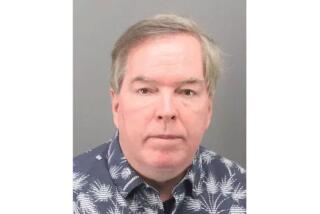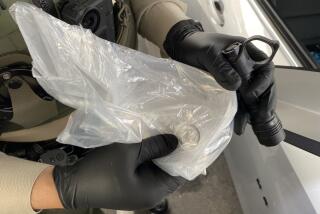3 Men Accused of Counterfeiting Computer Chips : Courts: Secret Service says Laguna Niguel resident was part of an operation in which the devices enabled cellular phone users to make free calls.
LOS ANGELES — Three Southern California men, including an Orange County resident, were indicted by a federal grand jury here Tuesday on charges that they counterfeited computer chips that enabled cellular telephone users to make free phone calls.
The charges came in two separate cases--one in Orange County and one in Los Angeles--stemming from the same investigation headed by the U.S. Secret Service.
In the first case, Kenneth Steven Bailey, 41, of Laguna Niguel, was charged with making and selling counterfeit devices in the Orange County area.
In the other, Robert Dewayne Sutton, 36, of Saugus and Dennis Mercer Allen, 33, of Los Angeles were indicted Tuesday by the same grand jury for a similar scheme. Sutton is accused of making counterfeit chips, and both men are charged with selling them.
Fitted into car phones, these computer chips allow drivers to make calls while making it impossible for telephone companies to discern who is doing the dialing.
“This is the first time that a federal grand jury has returned an indictment charging individuals with counterfeiting devices to be placed in cellular telephones,” U.S. Atty. Lourdes G. Baird said in a statement.
Prosecutors claim that Bailey sold five of the chips for $2,500 to a confidential informant working in a sting operation set up by the Secret Service. Blank computer chips can be purchased at neighborhood electronics stores for between $10 and $15 but they don’t work in car phones unless they are extensively programmed.
The Secret Service, whose responsibilities include closing down counterfeiting rings, claims it found all kinds of programming equipment inside Bailey’s house, including a computer and three floppy disks. Some 78 chips, many of them reprogrammed for car-phone use, were also found, the Secret Service claims.
Bailey could not be reached for comment. If convicted, he and Sutton could each be sentenced to up to 30 years in jail and fined up to $250,000.
Allen agreed to cooperate with federal authorities in an ongoing investigation of the counterfeiting of car-phone chips. He provided information that helped lead authorities to Bailey, according to Assistant U.S. Atty. Paula A. Mabrey. She said counterfeit chips are a growing problem in Los Angeles’ vast cellular telephone market.
Allen could receive a maximum prison sentence of seven years and six months.
Mabrey said arrest warrants were being sought for all three men.
More to Read
Sign up for Essential California
The most important California stories and recommendations in your inbox every morning.
You may occasionally receive promotional content from the Los Angeles Times.









